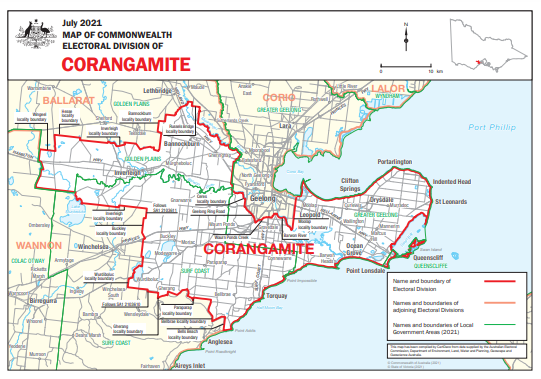|
|
|
|
| Adam Carr's Election Archive
|
Australian federal election, 2022
Division of Corangamite, Victoria
Named for: Lake Corangamite (Indigenous word meaning
"bitter water"), which was in the Division until 2019.*
South-western Victoria: Barwon Heads, Grovedale, Leopold, Queenscliff, Torquay
State seats: All of
Bellarine, parts of
Polwarth and
South Barwon
Local government areas: All of
Queenscliffe, parts of
Golden Plains,
Greater Geelong and
Surf Coast
Borders with:
Ballarat,
Corio and
Wannon
Enrolment at 2019 election: 111,638
Enrolment at 2022 election: 112,756 (+01.0)
1999 republic referendum: No 54.8
2018 same-sex marriage survey: Yes 71.6
Sitting member:
Libby Coker (Labor): Elected 2019
2007 Labor majority over Liberal: 0.9% *
2010 Labor majority over Liberal: 0.4% *
2013 Liberal majority over Labor: 3.9% *
2016 Liberal majority over Labor: 3.1% *
2019 Labor majority over Liberal: 1.1% *
2022 notional Labor majority over Liberal: 1.0%
* As Corangamite
Liberal two-party vote 1983-2019
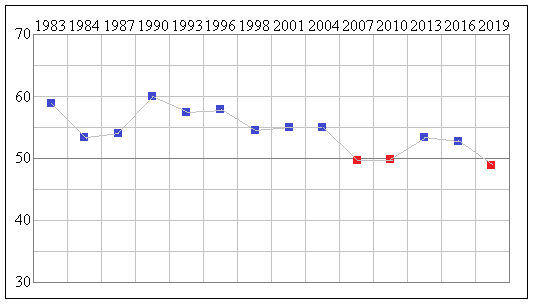
Status: Very marginal Labor
Best Labor booths, two-party vote: Bellbrae (64.4), Armstrong Creek East (62.0), Torquay North (59.4),
Grovedale Central (59.2), Ocean Grove South (59.2)
Best Liberal booths, two-party vote: Ceres (72.1), Moriac (60.6), Connewarre (60.2), Freshwater Creek
(59.2), Inverleigh (57.5)
2019 results
Statistics and history
Candidates in ballot-paper order:
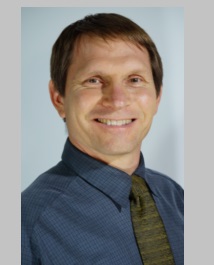 |
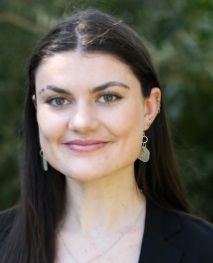 |
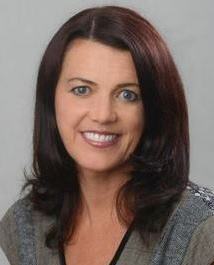 |
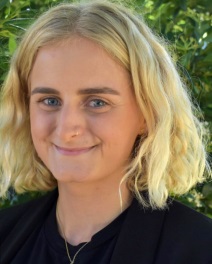 |
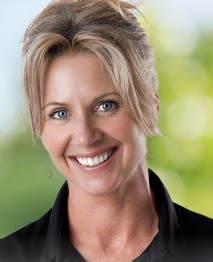 |
1. Stephen Juhasz
Federation Party |
2. Alex Marshall
Australian Greens |
3. Libby Coker
Australian Labor Party |
4. Meg Watkins
Animal Justice Party |
5. Stephanie Asher
Liberal Party |
 |
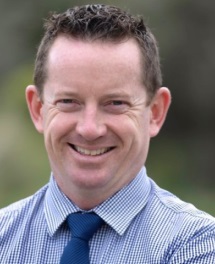 |
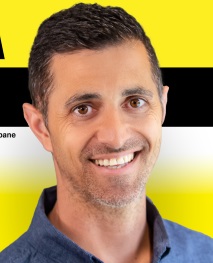 |
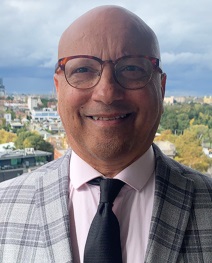 |
6. Luke Sorensen
Pauline Hanson's One Nation |
7. Paul Barker
Liberal Democrats |
8. Daniel Abou-zeid
United Australia Party |
9. Jean-Marie D'Argent
Derryn Hinch's Justice Party |
Candidate websites:
Daniel Abou-zeid
Stephanie Asher
Paul Barker
Libby Coker
Jean-Marie D'Argent
Stephen Juhasz
Alex Marshall
Meg Watkins
Division of Corangamite
Corangamite has existed since Federation, and for most of its history was located in south-west Victoria, based on Colac and the
surrounding rural areas. Until 2018 its
boundaries had changed very little over the years, but its demographics did change. The outer suburbs of Geelong spread into the
north-east of the seat, and the population of the Surf Coast towns increased greatly. This made what was once a very safe Liberal seat
increasingly marginal. Although the seat had a fairly high income level for a regional seat, it had the usual low proportion of people
born in non English speaking countries. It also had a high level of over-65s, reflecting the growth of retirement towns along the coast.
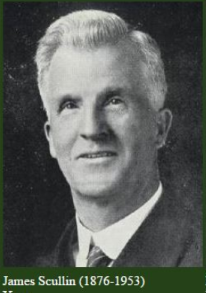 The 2018 redistribution changed the seat substantially, removing Colac and most of the rural areas, while adding the fast-growing Bellarine
Peninsula communities of Leopold and Portarlington. The 2021 redistribution has taken the process even further, cutting the seat back to
the Geelong suburbs and the Bellarine towns, and removing all the Surf Coast towns except Torquay. The seat is now a mix of coastal
towns and outer Geelong suburbs, most of it politically marginal. Labor's strongest areas are Geelong suburbs such as Grovedale, and the
remaining Surf Coast towns, notably Torquay. The Liberals dominate the remaining rural areas and some outer Geelong suburbs such as Ceres.
The 2018 redistribution changed the seat substantially, removing Colac and most of the rural areas, while adding the fast-growing Bellarine
Peninsula communities of Leopold and Portarlington. The 2021 redistribution has taken the process even further, cutting the seat back to
the Geelong suburbs and the Bellarine towns, and removing all the Surf Coast towns except Torquay. The seat is now a mix of coastal
towns and outer Geelong suburbs, most of it politically marginal. Labor's strongest areas are Geelong suburbs such as Grovedale, and the
remaining Surf Coast towns, notably Torquay. The Liberals dominate the remaining rural areas and some outer Geelong suburbs such as Ceres.
Jim Scullin, later Prime Minister, held Corangamite for one term (1910-13). At a by-election in 1919 Corangamite elected a Victorian Farmers Union
candidate,
William Gibson, marking the arrival in federal politics of what soon became the Country Party.
Tony Street, Foreign Minister in the
Fraser Government, held the seat from 1966. He resigned in 1984 and was succeeded by
Stewart McArthur. McArthur came from an old Western
District family (his father
Sir Gordon was a state MP for many years), but by 2007, when he was 70, he had been overtaken by the changes
in the seat. He was defeated by Labor's
Darren Cheeseman, who was narrowly re-elected in 2010.
Cheeseman was defeated in the strong swing to the
Liberals in Victoria in 2013. He is now state member for South Barwon.
Sarah Henderson, a barrister and former TV news reporter, won Corangamite in 2013 and was re-elected in 2016 with her majority only slightly
reduced. In 2018 she was appointed Assistant Minister for Social Services, Housing and Disability Services. But the 2018 redistribution wiped
out her majority, and in 2019 she was defeated - making the seat one of Labor's only two gains in that election. She was later appointed to a
Senate vacancy.
Libby Coker, Labor MP for Corangamite since 2019, is also a former journalist, and was twice Mayor of the Surf Coast Shire. On the new
boundaries, Corangamite is a more compact and more urban seat than previously. This should favour Coker's chances of re-election
in 2022, but this remains a highly marginal seat. The Liberal candidate is Stephanie Asher, the Mayor of Greater Geelong. The Greens candidate is
Alex Marshall, a disability support worker.
* It is not known who named Lake Corangamite: presumably early landholders. The name was in use in its
present form by 1842. In 2018 and again in 2021 the Electoral Commission proposed renaming Corangamite, on the grounds that Lake Corangamite is no longer in the
Division. But both times local opposition to renaming the Division prevailed.
Demographics (2018 boundaries):
Median weekly household income: $1,388 (Australia $1,438)
People over 65: 18.5% (Australia 15.8%)
Australian born: 81.3% (Australia 66.7%)
Non-English-speaking households: 7.9% (Australia 22.2%)
Catholics 23.0% (Australia 22.6%)
No religion 37.0% (Australia 29.6%)
University graduates: 22.2% (Australia 22.0%)
Professional and managerial employment: 35.9% (Australia 35.2%)
Employed in manufacturing and construction: 28.1% (Australia 22.9%)
Employed in agriculture: 5.1% (Australia 3.3%)
Paying a mortgage: 37.7% (Australia 34.5%)
Renting: 21.6% (Australia 30.9%)
Traditional families: 33.1% (Australia 32.8%)
Back to main page
| |
 The 2018 redistribution changed the seat substantially, removing Colac and most of the rural areas, while adding the fast-growing Bellarine
Peninsula communities of Leopold and Portarlington. The 2021 redistribution has taken the process even further, cutting the seat back to
the Geelong suburbs and the Bellarine towns, and removing all the Surf Coast towns except Torquay. The seat is now a mix of coastal
towns and outer Geelong suburbs, most of it politically marginal. Labor's strongest areas are Geelong suburbs such as Grovedale, and the
remaining Surf Coast towns, notably Torquay. The Liberals dominate the remaining rural areas and some outer Geelong suburbs such as Ceres.
The 2018 redistribution changed the seat substantially, removing Colac and most of the rural areas, while adding the fast-growing Bellarine
Peninsula communities of Leopold and Portarlington. The 2021 redistribution has taken the process even further, cutting the seat back to
the Geelong suburbs and the Bellarine towns, and removing all the Surf Coast towns except Torquay. The seat is now a mix of coastal
towns and outer Geelong suburbs, most of it politically marginal. Labor's strongest areas are Geelong suburbs such as Grovedale, and the
remaining Surf Coast towns, notably Torquay. The Liberals dominate the remaining rural areas and some outer Geelong suburbs such as Ceres. 
